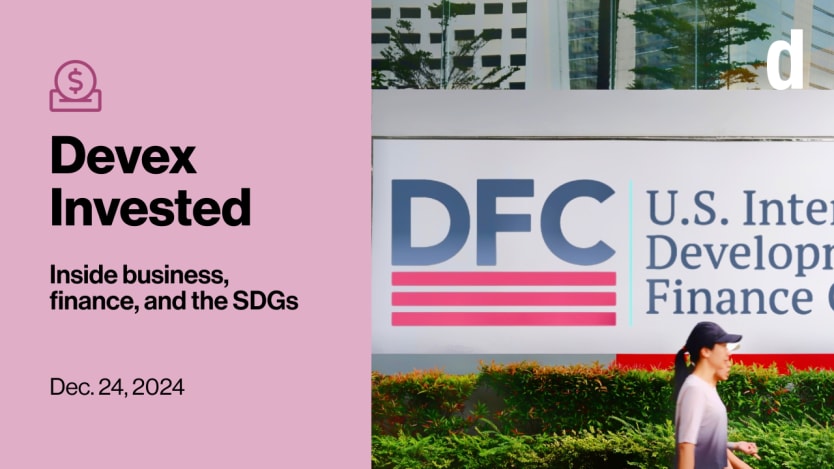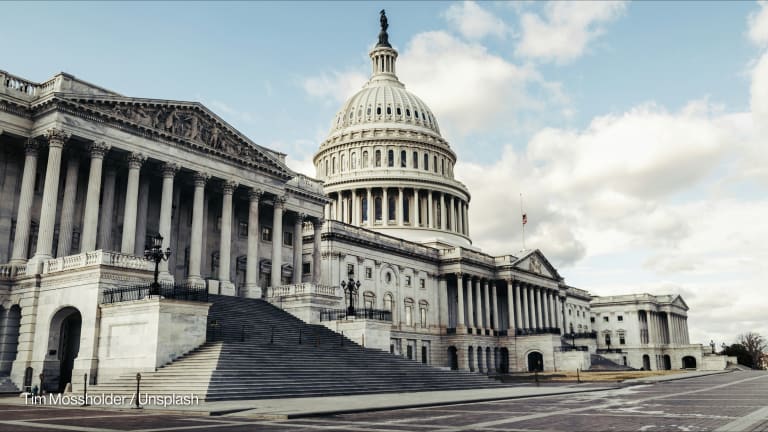
Five years ago, an unlikely coalition helped create the U.S. International Development Finance Corporation, rescuing its predecessor from elimination and doubling down on development finance — in part to counter Chinese economic investments around the world.
In that time, the agency has committed nearly $50 billion, including more than $12 billion last year alone. It also doubled its annual transactions, doing 181 in fiscal year 2024. About 70% of its investments are in low-income or lower-middle-income countries. The agency has also tripled its staff and opened offices in the Dominican Republic, Brazil, South Africa, India, Thailand, Singapore, and Indonesia.
This is a preview of Devex Invested
Sign up to this weekly newsletter to get the insider brief on business, finance, and the SDGs in your inbox every Tuesday.
The consensus seems to be that the agency has done pretty well in the face of some challenges, such as starting amidst the COVID-19 pandemic, leadership changes, and a structural organization that stirred up staff discontent. There were also forays into domestic U.S. investing that raised concerns but didn’t pan out, and some big promises to other countries that had to be walked back.
“DFC continues to go from strength to strength,” David Bohigian, former acting president and CEO of DFC’s predecessor — the Overseas Private Investment Corporation — and who led the transition to DFC, tells Adva. “Development finance has never been a more important part of American statecraft.”
That said, experts say there is room for improvement, including:
• Taking more risk, especially to attract more private investment into deals.
• Being more proactive in seeking investment opportunities that align with its priorities.
• Speeding up the time it takes to get a deal done to be more attractive to the private sector and to better compete with China.
• Improving transparency, especially about impact at the individual project level, and ensuring accountability by operationalizing the independent accountability mechanism.
And there’s the whole matter of the agency’s reauthorization, which stalled in the U.S. Congress this year, despite efforts to pass it well in advance of DFC’s mandate expiring next October. It will now fall to the next Congress, and is particularly critical because DFC risks running out of money that it can invest if its mandate isn’t renewed and its $60 billion lending cap increased — proposals have been to double it. The reauthorization is also likely to expand the number of countries the agency can work in and may address the way equity is accounted for.
And what can be expected in the incoming Trump administration? The agency should be in good standing, but “a lot of wokeism will go away and it will focus on what we need to do,” former Florida Rep. Ted Yoho, a Republican co-sponsor of the BUILD Act, tells Adva. He predicted a renewed focus on "bare brass infrastructure projects" aimed at developing economies.
Read: Five years in, DFC navigates growth, reform, and global competition
Plus: DFC has record year following reorganization, but needs reauthorization (Pro)
+ Not yet a Devex Pro member? Start your 15-day free trial today to read the piece and get access to all our exclusive reporting and analyses, members-only events, and more.
A note to our readers: This is our last edition for 2024. We’re taking a holiday break and will be back in your inboxes on Jan. 7. Thanks for reading Invested and attending our events in 2024!
The bright side
“You never write about all the good things that are happening!” We hear that a lot as development journalists. So, my colleague Jessica Abrahams has this list of the good news from 2024. See if you agree:
1. Humanitarian needs fell.
There were 323 million in need in late November, down from 363 million at the end of 2023.
2. Some donors restored the faith.
Foreign aid cuts continued from big names such as France and Germany, though some donors defied the trend. Japan’s official development assistance continues to soar, although it’s largely made up of concessional loans.
3. Climate finance reached a record high.
A record $125 billion in 2023 marked a huge step up from the year before. A new annual target of $300 billion was also agreed at the United Nations’ COP29 climate conference, though advocates argued that it fell far short of what was needed.
4. There was a landmark G20.
Some saw language on a tax on the ultra-rich as a win, plus a new Global Alliance Against Hunger and Poverty was launched.
5. The fight against malaria saw some historic achievements.
Egypt was certified malaria-free after a 100-year effort, and the first malaria vaccines were added to the routine immunization programs of several African countries following successful pilots.
6. We saw some ‘exceptional’ virus control.
Sometimes no news is good news. In September, Rwanda declared that it was experiencing its first outbreak of Marburg, a deadly virus that had the potential to become a major news story. But the outbreak was met with a swift and skillful response.
Read: 6 good news stories from 2024
Dam funders
We wrote in last week’s edition about the Rogun Dam in Tajikistan going before the World Bank board of directors.
Well, as Jacques Leslie writes for Yale University, directors approved a plan to make the bank the lead financier in a $6.3 billion undertaking to finish the construction of the dam. Leslie writes that the Rogun project — which first launched in 1976 and would stand at 1,100 feet once complete — is part of the World Bank’s return to hydroelectric dams.
Inga 3 in the Democratic Republic of the Congo and the Upper Arun in Nepal are in the bank’s sights too, though the trend has environmental advocates alarmed over the destruction of ecosystems, displacement of local people, and more.
“The World Bank is revisiting projects it once dropped because of obvious challenges and risks,” Eugene Simonov, coordinator of the Rivers Without Boundaries International Coalition, is quoted as saying. “But those risks did not go away.”
Audit this
In October, we wrote about how the Dutch development bank, FMO, had used a guarantee from the European Union’s common budget to invest in tech-related companies in the agriculture and energy sectors around the world.
“At the outset, I think the guarantee was really needed,” FMO’s Co-Chief Investment Officer Huib-Jan de Ruijter told us. “If you look in hindsight, we could have done it without [it].” That’s one way of defining additionality, we suppose.
Your next job?
Access to Finance (IR2) Lead - Morocco EcoRise
RTI International
Morocco
Now the European Court of Auditors has taken a close look at the EU guarantee experiment, overseen by the European Commission in Brussels. And as the auditors write in their report published this month, they have some concerns:
• A commission study of the scheme simultaneously claims everything is going well and that it is too early to draw any conclusions.
• The commission is making bold claims about the potential leverage effect, but without any details on how that will be measured.
• The commission is yet to publish the minutes and agendas of the meetings of the strategic board overseeing the guarantees, as required under the relevant regulation.
We asked the commission why it had not published the board minutes and were told: "The Commission is in the process of publishing the minutes of the meetings of the EFSD+ Strategic Board. They should be available at the beginning of next year."
So, that’s our New Year’s wish taken care of.
What we’re reading
African Development Bank announces plan to build headquarters in Abidjan. [AfDB]
Will remittances decrease in 2025? Will it be the year of diaspora bonds? The World Bank gives its answers. [World Bank blog]
Plan to ban foreign fossil fuel financing collapses at OECD. [Bloomberg]









